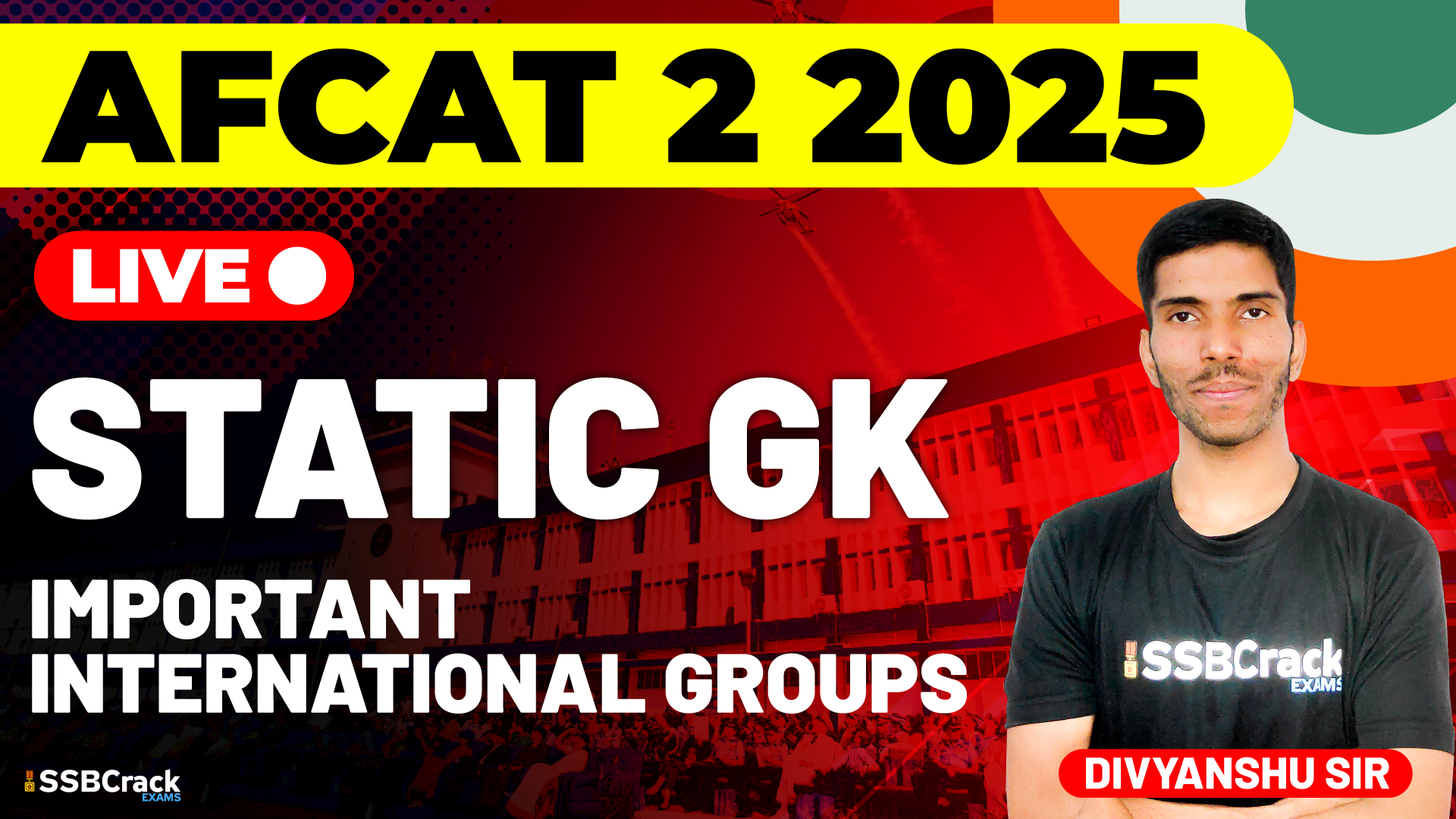Static GK plays a crucial role in clearing the AFCAT 2 2025 Exam, especially in the General Awareness section. Among the static topics, International Organizations and Groups hold significant importance as questions related to global governance, defense alliances, and international cooperation are often asked. In this article, we bring you a comprehensive list of Important International Groups and Organizations relevant for AFCAT 2025 preparation.
AFCAT 2 2025 Exam Static GK – Important International Groups
🌍 Why Study International Groups for AFCAT?
- To understand global diplomatic and strategic alignments
- For awareness about India’s role in international organizations
- Questions from this topic are frequent in AFCAT, CDS, and CAPF exams
🔹 Major International Groups & Organizations
1. United Nations (UN)
- Founded: 1945
- Headquarters: New York, USA
- Members: 193
- Key Bodies: UNGA, UNSC, UNESCO, UNICEF, WHO
- India’s Role: Founding member, contributor to peacekeeping forces
2. North Atlantic Treaty Organization (NATO)
- Founded: 1949
- Headquarters: Brussels, Belgium
- Members: 32 (as of 2024, including Sweden)
- Objective: Military alliance for collective defense
- India’s Status: Not a member
3. South Asian Association for Regional Cooperation (SAARC)
- Founded: 1985
- Headquarters: Kathmandu, Nepal
- Members: 8 (India, Pakistan, Nepal, Bhutan, Bangladesh, Sri Lanka, Maldives, Afghanistan)
- Objective: Promote regional cooperation in South Asia
4. BRICS
- Members: Brazil, Russia, India, China, South Africa
- Founded: 2009
- Focus: Economic cooperation, New Development Bank
- Recent Addition: In 2024, Egypt, Ethiopia, Iran, Saudi Arabia, and UAE joined
5. G20 (Group of Twenty)
- Founded: 1999
- Members: 19 countries + European Union
- India’s Role: Hosted G20 Summit in 2023 (Delhi)
- Focus: Global financial stability, economic policy coordination
6. Commonwealth of Nations
- Founded: 1931
- Headquarters: London, UK
- Members: 56 (mostly former British colonies)
- India’s Status: Republic member, active participant
7. Shanghai Cooperation Organisation (SCO)
- Founded: 2001
- Headquarters: Beijing, China
- Members: 9 (including India, Russia, China, Pakistan, Iran)
- India’s Status: Full member since 2017
- Focus: Political, economic, and security cooperation
8. ASEAN (Association of Southeast Asian Nations)
- Founded: 1967
- Headquarters: Jakarta, Indonesia
- Members: 10 (e.g., Indonesia, Thailand, Singapore)
- India’s Role: Strategic partner, part of ASEAN+6
9. Quad (Quadrilateral Security Dialogue)
- Members: India, USA, Japan, Australia
- Purpose: Indo-Pacific security, maritime cooperation
- Not a Formal Group, but highly relevant in geopolitics
10. International Monetary Fund (IMF)
- Founded: 1944
- Headquarters: Washington D.C., USA
- Focus: Global monetary cooperation, financial stability
- India’s Role: Founding member
11. World Bank Group
- Founded: 1944
- Includes: IBRD, IDA, IFC, MIGA
- Headquarters: Washington D.C., USA
- India’s Role: Borrower and contributor
12. World Trade Organization (WTO)
- Founded: 1995
- Headquarters: Geneva, Switzerland
- Focus: Trade liberalization, dispute resolution
- India’s Role: Active participant
📝 AFCAT Static GK Tips on International Groups
- Focus on Headquarters, Year of Establishment, Member Countries, and India’s Role
- Learn recent developments, such as new members, summits, or India’s presidency
- Revise using flashcards or tables for quick retention
🧠 Sample Questions
- Where is the headquarters of the Shanghai Cooperation Organisation located?
A) Moscow
B) New Delhi
C) Beijing
D) Astana
Answer: C) Beijing - India is not a member of which of the following?
A) SAARC
B) SCO
C) NATO
D) BRICS
Answer: C) NATO
📌 Conclusion
International groups form the backbone of global governance and diplomacy. As an AFCAT aspirant, your understanding of these organizations will not only help in the Static GK section but also build awareness for SSB interviews and defense current affairs. Stay updated, revise regularly, and focus on India’s growing global influence.








